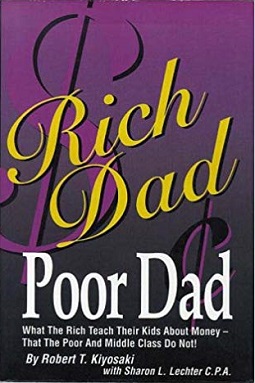Rich Dad Poor Dad
Rich Dad Poor Dad is a 1997 book written by Robert Kiyosaki and Sharon Lechter. It advocates the importance of financial literacy (financial education), financial independence, and building wealth through investing in assets, real estate investing, starting and owning businesses, as well as increasing one's financial intelligence (financial IQ) to improve one's business and financial decisions. Rich Dad Poor Dad is written in the style of a set of parables, ostensibly based on Kiyosaki's life.
Summary[edit | edit source]
The book is largely based on Kiyosaki's upbringing and education in Hawaii. It contrasts two perspectives: his "poor dad" – his real father, a highly educated man who was a high-ranking government official but faced financial struggles, and his "rich dad" – the father of his best friend, a wealthy entrepreneur who dropped out of school but went on to build a business empire. Kiyosaki uses the story of these two men and their differing financial strategies as a way to discuss his views on money, investing, and how to achieve financial independence.
Themes[edit | edit source]
Rich Dad Poor Dad covers several main themes:
- The importance of financial education
- The difference between assets and liabilities
- The value of investing in real estate and other income-generating assets
- The need to learn how to manage money and make it work for you
- The idea that traditional education does not prepare you for financial success
Reception[edit | edit source]
The book has been a massive commercial success, selling millions of copies worldwide. It has been translated into dozens of languages and has spent over six years on the New York Times bestsellers list. However, it has also faced criticism for its financial advice, with some accusing it of promoting risky investment strategies and providing oversimplified advice on complex financial matters.
Impact[edit | edit source]
Rich Dad Poor Dad has had a significant impact on the way people view and manage their finances. It has inspired many to pursue financial independence and entrepreneurship. The book has also spawned a series of related books, games, and seminars about financial education, further extending its influence.
Controversies[edit | edit source]
Critics have questioned the veracity of Kiyosaki's account of the "rich dad" and have pointed out that much of the advice in the book, while motivational, lacks the depth and caution necessary for real-world financial decision-making. Despite these criticisms, the book remains popular for its accessible approach to introducing financial concepts.
See Also[edit | edit source]
Search WikiMD
Ad.Tired of being Overweight? Try W8MD's physician weight loss program.
Semaglutide (Ozempic / Wegovy and Tirzepatide (Mounjaro / Zepbound) available.
Advertise on WikiMD
|
WikiMD's Wellness Encyclopedia |
| Let Food Be Thy Medicine Medicine Thy Food - Hippocrates |
Translate this page: - East Asian
中文,
日本,
한국어,
South Asian
हिन्दी,
தமிழ்,
తెలుగు,
Urdu,
ಕನ್ನಡ,
Southeast Asian
Indonesian,
Vietnamese,
Thai,
မြန်မာဘာသာ,
বাংলা
European
español,
Deutsch,
français,
Greek,
português do Brasil,
polski,
română,
русский,
Nederlands,
norsk,
svenska,
suomi,
Italian
Middle Eastern & African
عربى,
Turkish,
Persian,
Hebrew,
Afrikaans,
isiZulu,
Kiswahili,
Other
Bulgarian,
Hungarian,
Czech,
Swedish,
മലയാളം,
मराठी,
ਪੰਜਾਬੀ,
ગુજરાતી,
Portuguese,
Ukrainian
Medical Disclaimer: WikiMD is not a substitute for professional medical advice. The information on WikiMD is provided as an information resource only, may be incorrect, outdated or misleading, and is not to be used or relied on for any diagnostic or treatment purposes. Please consult your health care provider before making any healthcare decisions or for guidance about a specific medical condition. WikiMD expressly disclaims responsibility, and shall have no liability, for any damages, loss, injury, or liability whatsoever suffered as a result of your reliance on the information contained in this site. By visiting this site you agree to the foregoing terms and conditions, which may from time to time be changed or supplemented by WikiMD. If you do not agree to the foregoing terms and conditions, you should not enter or use this site. See full disclaimer.
Credits:Most images are courtesy of Wikimedia commons, and templates Wikipedia, licensed under CC BY SA or similar.
Contributors: Prab R. Tumpati, MD

